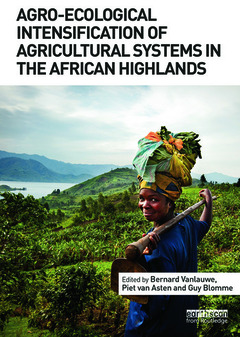Description
Agro-Ecological Intensification of Agricultural Systems in the African Highlands
Coordinators: Vanlauwe Bernard, van Asten Piet, Blomme Guy
Language: English
Subjects for Agro-Ecological Intensification of Agricultural Systems...:
Keywords
Sustainable Development; Sustainable Agriculture; Agriculture and Food; African Studies; Sub-Saharan Africa; Food Security; Rural Livelihoods; East African Highland Banana; Environment and Sustainability; Agro Ecological Intensification; Mixed Crop Livestock Farming Systems; Soil Fertility; Coping Strategy Index; Soil Fertility Management Practices; Sud Kivu; World Agroforestry Centre; Smallholder Farming Systems; Central African Highlands; Pe Rc; Van Asten; East African Highlands; Soil Fertility Management; Tropical Soil Biology; IITA; Site Selection; ISFM; Sustainable Intensification; Faba Bean; Agro Ecological Solution; Mandate Areas; Bean Cultivation; Humid Highlands; Engle Granger Procedure
336 p. · 15.6x23.4 cm · Hardback
Description
/li>Contents
/li>Readership
/li>Biography
/li>
There is an urgent need to increase agricultural productivity in sub-Saharan Africa in a sustainable and economically-viable manner. Transforming risk-averse smallholders into business-oriented producers that invest in producing surplus food for sale provides a formidable challenge, both from a technological and socio-political perspective.
This book addresses the issue of agricultural intensification in the humid highland areas of Africa ? regions with relatively good agricultural potential, but where the scarce land resources are increasingly under pressure from the growing population and from climate change.
In addition to introductory and synthesis chapters, the book focuses on four themes: system components required for agricultural intensification; the integration of components at the system level; drivers for adoption of technologies towards intensification; and the dissemination of complex knowledge. It provides case studies of improved crop and soil management for staple crops such as cassava and bananas, as well as examples of how the livelihoods of rural people can be improved.
The book provides a valuable resource for researchers, development actors, students and policy makers in agricultural systems and economics and in international development. It highlights and addresses key challenges and opportunities that exist for sustainable agricultural intensification in the humid highlands of sub-Saharan Africa.
1. Agro-ecological Intensification of Farming Systems in the East and Central African Highlands 2. Agricultural Intensification and the Food Security Challenge in Sub-Saharan Africa 3. The Agro-ecological Solution?! Food Security and Poverty Reduction in Sub-Saharan Africa, with an Emphasis on the East African Highlands Theme 1: Systems Components 4. CIALCA Interventions for Productivity Increase of Cropping System Components in the African Great Lakes Zone 5. Exploring the Scope of Fertilizer Use in the East African Region 6. The 4R Nutrient Stewardship in the Context of Smallholder Agriculture in Africa 7. Mitigating the Impact of Biotic Constraints to Build Resilient Banana Systems in Central and Eastern Africa 8. Challenges for the Improvement of Seed Systems for Vegetatively Propagated Crops in Eastern Africa Theme 2: System Integration 9. CIALCA's Efforts on Integrating Farming System Components and Exploring Related Trade-offs 10. Towards Ecologically Intensive Smallholder Farming Systems: Design, Scales and Trade-offs Evaluation 11. Using the ‘Livestock Ladder’ as a Means for Poor Crop–livestock Farmers to Exit Poverty in Sud-Kivu Province, Eastern DR Congo 12. N2Africa: Putting Nitrogen Fixation to Work for Smallholder Farmers in Africa 13. Integrating Climate Change Adaptation and Mitigation in East African Coffee Ecosystems Theme 3: Drivers for Adoption 14. Agricultural Technology Diffusion and Adoption in Banana and Legume Based Systems of Central Africa 15. Supply and Demand Drivers of the Sustainable Intensification of Farming Systems through Grain Legumes in Central, Eastern and Southern Africa 16. Assessing and Improving the Nutritional Diversity of Cropping Systems 17. Disseminating Agroforestry Innovations in Cameroon: Are Relay Organizations Effective? 18. Participatory Re-introduction of Vicia Faba Beans in Resource-poor Farming Systems: Adoption of a Farmer-led Initiative Theme 4: Communicating and Disseminating Complex Knowledge 19. Walking the Impact Pathway: CIALCA’s Efforts to Mobilize Agricultural Knowledge for the African Great Lakes Region 20. Scalability and Farmer Heterogeneity: Implications for Research on Sustainable Intensification 21. Integrated Agricultural Research for Development (IAR4D): An Approach to Enhance the Livelihoods of Smallholder Farmers in the Lake Kivu Region 22. Communication Channels Used in Dissemination of Soil Fertility Management Practices in the Central Highlands of Kenya 23. Targeting Farmers’ Priorities for Effective Agricultural Intensification in the Humid Highlands of Eastern Africa
Bernard Vanlauwe is the director for Central Africa and Natural Resource Management at the International Institute of Tropical Agriculture (IITA), based in Nairobi, Kenya.
Piet van Asten is a systems agronomist at IITA-Uganda working on sustainable intensification of perennial-based cropping systems (coffee, banana, cocoa) in Africa's humid zones, based in Kampala, Uganda.
Guy Blomme is a Bioversity International scientist working on germplasm and integrated disease management for more resilient and productive banana-based cropping systems in east and central Africa, based in Kampala, Uganda.




